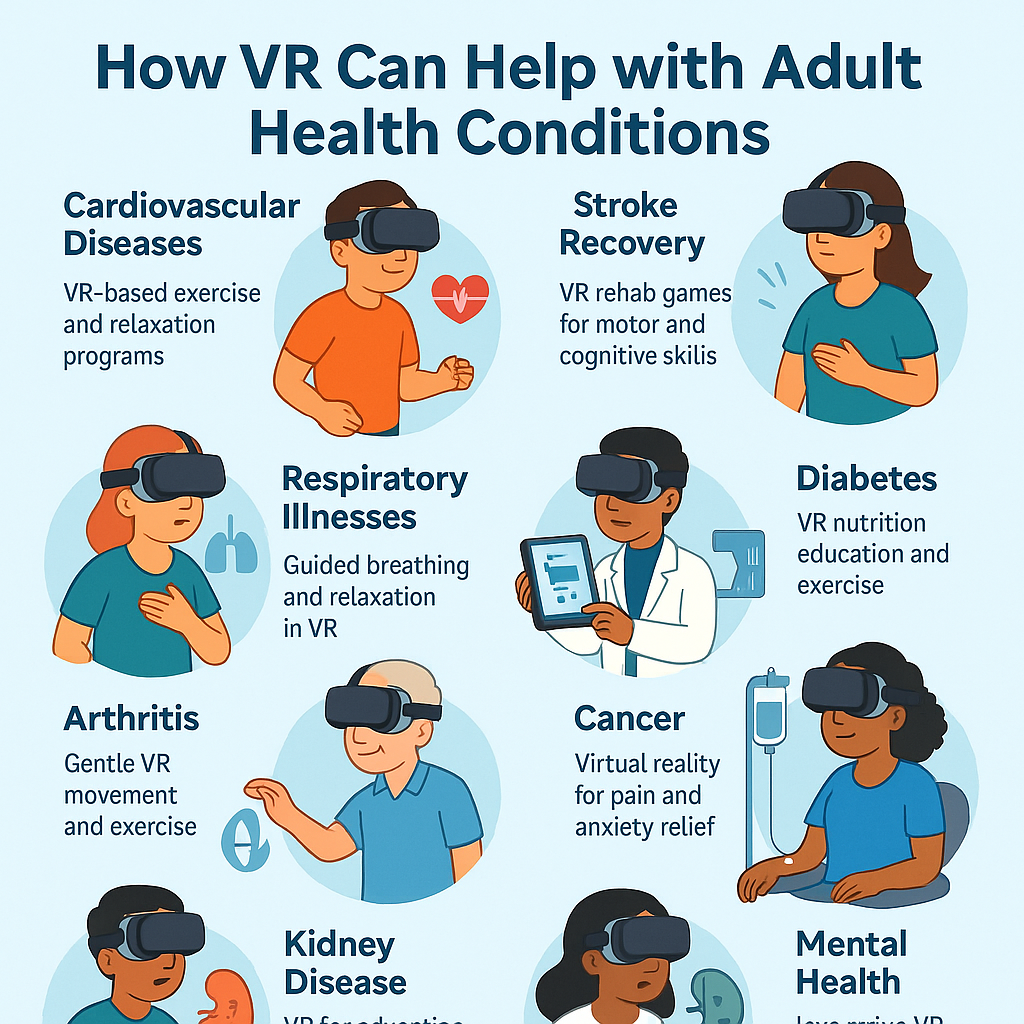
How Virtual Reality (VR) Can Help Adults Manage Health Conditions
Virtual Reality (VR) is more than entertainment—it’s a powerful therapeutic tool that can
support adults in managing acute and chronic health conditions. From physical
rehabilitation to mental health support, VR offers immersive, engaging, and effective
interventions tailored to individual needs.
Cardiovascular Diseases – Heart Disease & Hypertension
Description: Heart disease and high blood pressure require lifestyle management and stress
reduction.
How VR Helps: VR-based guided exercise programs encourage safe, low-impact workouts
that strengthen the heart without overexertion. Relaxation and meditation simulations
lower stress, supporting blood pressure control.
Benefit: Improves cardiovascular health, reduces stress, and encourages consistent physical
activity.
Cardiovascular Diseases – Stroke Recovery
Description: Stroke can affect motor skills, balance, and cognition.
How VR Helps: VR rehabilitation games retrain fine motor skills, balance, and coordination,
while brain-training exercises in VR support cognitive recovery.
Benefit: Enhances motor control, promotes neuroplasticity, and improves daily functioning.
Respiratory Illnesses – Asthma & COPD
Description: Chronic breathing conditions require improved lung capacity and stress
control.
How VR Helps: Guided breathing exercises in VR teach lung expansion and slow breathing
patterns, while relaxation simulations reduce flare-ups.
Benefit: Supports better breathing habits and reduces respiratory distress.
Chronic Conditions – Diabetes
Description: Managing diabetes requires education, exercise, and nutrition awareness.
How VR Helps: VR programs simulate grocery shopping for healthy foods, interactive
cooking lessons, and safe fitness activities.
Benefit: Improves blood sugar management and promotes a healthier lifestyle.
Chronic Conditions – Arthritis
Description: Joint pain and stiffness reduce mobility and independence.
How VR Helps: Gentle movement games in VR maintain joint flexibility without
overexertion, such as virtual Tai Chi or yoga.
Benefit: Reduces stiffness, improves range of motion, and encourages daily movement.
Chronic Conditions – Cancer
Description: Cancer treatment can cause pain, anxiety, and fatigue.
How VR Helps: VR offers distraction therapy during chemotherapy, guided meditation for
pain relief, and gentle rehabilitation activities.
Benefit: Eases treatment anxiety, manages pain, and supports emotional well-being.
Chronic Conditions – Kidney Disease
Description: Managing kidney disease requires strict dietary and lifestyle habits.
How VR Helps: VR education modules teach dietary restrictions, fluid management, and
dialysis preparation through interactive scenarios.
Benefit: Improves patient knowledge and adherence to care plans.
Mental Health – Depression
Description: Depression can cause isolation, low mood, and loss of interest.
How VR Helps: VR provides uplifting environments, guided therapy sessions, and safe social
spaces to encourage engagement.
Benefit: Boosts mood, reduces loneliness, and supports emotional resilience.
Mental Health – Anxiety Disorders
Description: Anxiety disorders often involve excessive worry and avoidance behaviors.
How VR Helps: VR exposure therapy allows gradual, controlled exposure to fears, such as
public speaking or flying.
Benefit: Helps reduce fear responses and build coping skills.
Other Conditions – Infectious Disease Recovery
Description: Infectious diseases may require long recovery periods.
How VR Helps: VR offers cognitive games and virtual social interaction to keep patients
mentally active during bed rest.
Benefit: Prevents isolation and supports mental stimulation.
Other Conditions – Digestive Issues (IBS & IBD)
Description: Digestive conditions can be aggravated by stress.
How VR Helps: Mindfulness and gut-focused hypnotherapy programs in VR have been
shown to relieve symptoms.
Benefit: Reduces stress-related symptom flare-ups.
Other Conditions – Oral & Dental Health
Description: Dental anxiety and poor oral hygiene are common issues.
How VR Helps: VR distraction therapy reduces anxiety during dental procedures, and VR
tutorials teach proper brushing and flossing.
Benefit: Improves dental experience and encourages good oral hygiene habits.
